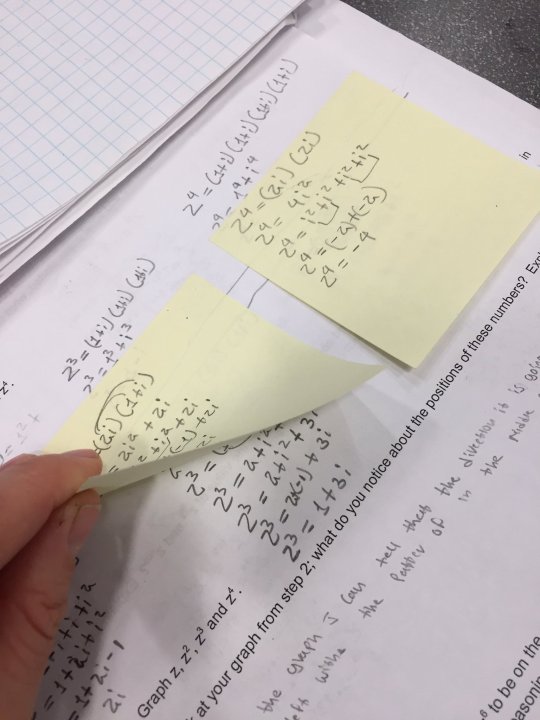This past week we asked the Desmos fellows to share a resource that they got
from a workshop or conference presentation that they found useful, and to
describe why the resource was memorable.
We didn’t end up with a particular type of resource that was useful, but rather doing this exercise helped highlight both the types of learning experiences that we value as well as what makes professional learning stick. We draw two main conclusions from this exercise:
-
Our group tended to remember the professional learning experiences where a
big idea resonated with us.
-
Effective professional development starts by looking at student work. Many
of us had been in workshop where we were asked to play the role of a student
with the facilitator playing the role of the teacher. The activity debrief
included a discussion of the teacher moves and possible teacher moves along
with the intent behind each. These discussions helped us connect ideas to
our own practice, making it easier to implement in our classrooms.
Here are some of our experiences (and resources) that were most memorable:
Supporting Conceptual Understanding
Many of us remembered an experience where we deepened our own understanding of the mathematics we teach, helping us value a conceptual approach to teaching in general.
-
Glenn Waddell shared
12 Math Rules that Expire in the Middle Grades
that he learned about from an NCTM session.
-
Dave Sabol attended an Exeter
Math Institute session on using origami to teach Euclidian geometry, and has
been using such ideas ever since.
-
During Anna Scholl’s first
year of teaching she used materials from the UT Dana Center on connecting
multiple representations. This learning experience has stayed with Anna over
the years as she continues to incorporate activities where students learn
conceptually through discovery.
Class Culture and Instructional Strategies
- Jade White has had students using sticky notes to reflect on mistakes and improve understanding, an idea that was inspired by use of sticky notes in workshops during the brainstorming process. She says, “I was curious if I could use stickies in my class as they are used in design when students are working and find a mistake. A new norm in the class is to grab a sticky and resolve the problem on the sticky when they find a mistake in their work. I have found that students have become more comfortable with making mistakes and see them more as a learning experience now.”

- Bob Lochel learned about flipped teaching as part of his participation as a Siemens STEM Fellow. He appreciated the simplicity of the speaker’s message and ideas for what class should look and feel like in a flipped environment. Bob often finds himself coming back to these materials.
-
Tony Riehl shared his experience
learning to incorporate a new curriculum using
5 Practices for Orchestrating Productive Mathematics Discussions. His district no longer uses the curriculum, but they regularly
incorporate the strategies from this book.
What professional learning experiences do you remember best? What made those experiences memorable? Let us know on Twitter @desmos.
